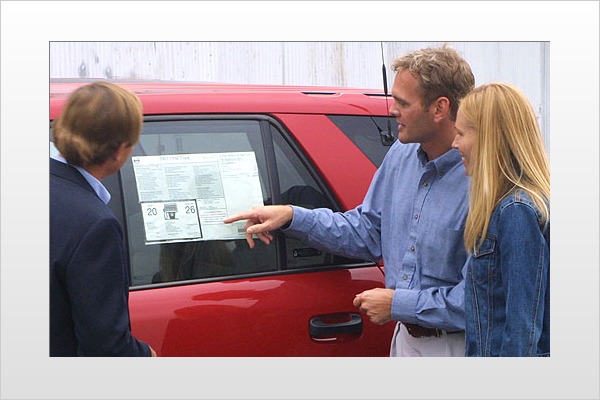 Don't be so dazzled by glass and chrome that you forget to choose a car that offers good fuel efficiency.
Don't be so dazzled by glass and chrome that you forget to choose a car that offers good fuel efficiency.
Although gas prices have tapered off, the prices are slowly creeping back up. And yet, carmakers are in a horsepower war. Cars have never been bigger or more powerful. Engines putting out more than 200 horsepower have become commonplace. Our lust for power has turned our country into a thirsty nation that is also very dependent on its oil from foreign sources.
Choosing a more fuel-efficient car will keep more money in your pocket, save our natural resources and reduce air pollution. Those are all good things. So, how do you proceed?
A good starting point is to check out these lists provided by Edmunds.com: Top 10 Most Fuel-Efficient Sedans for 2009 and Top 10 Most Fuel-Efficient SUVs and Crossovers for 2009. If one of these vehicles doesn't catch your eye, consider the following general rules when searching for a car that delivers good fuel economy.
Four-Cylinder vs. V6 and V8: In most cases, the smaller the engine the better the fuel economy. This means that instead of buying a car with a V6 or V8 engine, consider getting the four-cylinder engine for that car. The initial purchase price will be lower and you will save money on gas. Many four-cylinder engines these days are very lively and will provide plenty of power for merging and passing.
Standard vs. Automatic Transmission: Automatic transmissions often come as a $700 option on many cars. Not only that, but the manual-shift car usually gets better gas mileage. If you don't live in the city and don't get stuck in traffic a lot, this is a money-saving alternative for you.
Hybrids: A number of different hybrid vehicles are on the market now. In some hybrids (the Ford Fusion Hybrid and the Toyota Prius), the gas mileage is top of the class. More recently, hybrids are getting better fuel economy without having to sacrifice performance.
Diesels: In the past, diesels have had a bad rap because they were thought to be slow, smelly and noisy. Recently, technology has improved and you can barely tell you are driving a diesel. In some cases the fuel economy provided by diesels, rivals hybrid cars. Currently Volkswagen, Audi, Mercedes-Benz, and BMW are offering several models with a diesel engine. , the mileage numbers are much closer to what you can expect in the real world.
Fuel estimates also serve an important function. The mileage estimates allow you to factor the fuel cost into your car selection. Estimate how much you will drive each year (for most of us it is about 12,000 miles). Divide this number by the estimated miles per gallon of the car you are considering. If a car gets, for example, 15 miles per gallon, you will be buying 800 gallons of gas a year. At $2.63 per gallon that is $2,104 a year you will spend on fuel.
Now let's pretend that you decide to make fuel mileage a priority and buy a car that gets, say, 30 miles per gallon. You will save $500 a year. Would you like to have $500 more at the end of this year? Just think, you could put that money toward paying off your car loan faster.
At $2.63 a gallon, these figures aren't very impressive. But how will you feel as gas prices approach $5 a gallon? If you've made fuel economy a priority now, you won't be caught unprepared when that day arrives. If you continue to ignore the current trend, you might have to make cuts in your family budget just to feed the gas guzzler. Don't get caught in that situation. Be smart, think ahead and save.